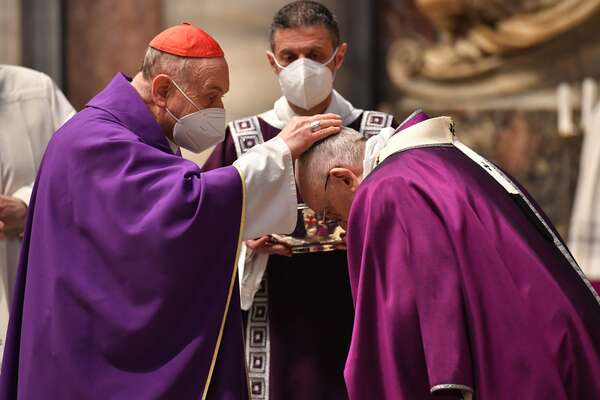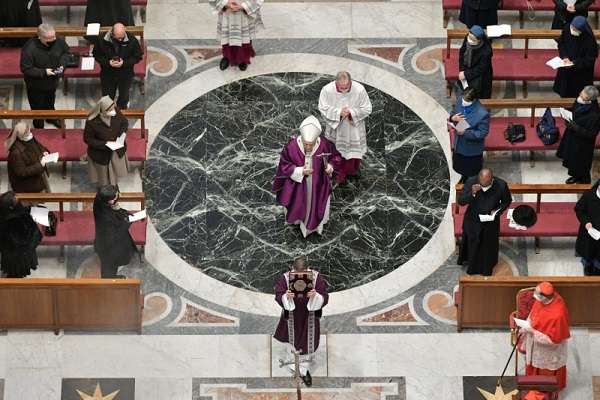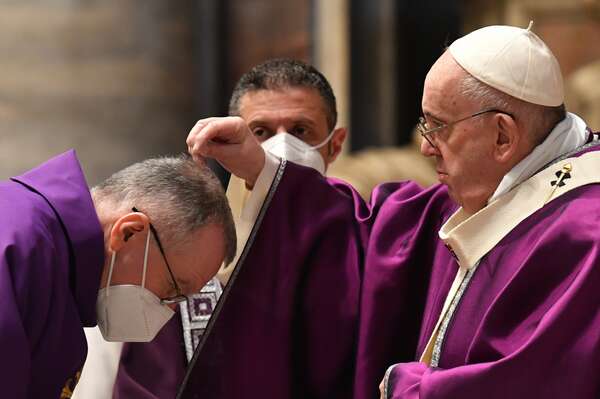Pope Francis says Ash Wednesday Mass in St. Peter’s Basilica Feb. 17, 2021. Credit: Vatican Media.
The 40 days of Lent are an opportunity to turn from the slavery of sin to the freedom found in reconciliation with God, Pope Francis said today, Ash Wednesday.
“The journey of Lent is an exodus from slavery to freedom,” the pope said this morning. “These forty days correspond to the forty years that God’s people trekked through the desert to return to their homeland. How difficult it was to leave Egypt!”

The Israelites had many temptations during the 40 years they wandered in the desert and “so it is with us,” Francis added. “Our journey back to God is blocked by our unhealthy attachments, held back by the seductive snares of our sins, by the false security of money and appearances, by the paralysis of our discontents.”
“To embark on this journey, we have to unmask these illusions.”
To mark the start of Lent, Pope Francis offered Mass at the Altar of the Chair in St. Peter’s Basilica with about 50 cardinals and a congregation of around 100 people.
It has been the pope’s tradition to say the Ash Wednesday Mass at the Basilica of Santa Sabina on Rome’s Aventine Hill following a short procession from the nearby St. Anselm Church.
But due to the ongoing coronavirus pandemic, this year the Mass was offered at the Vatican.

In his homily, Pope Francis reflected on St. Paul’s exhortation in 2 Corinthians to “be reconciled to God.”
“Be reconciled: the journey is not based on our own strength,” he said. “Heartfelt conversion, with the deeds and practices that express it, is possible only if it begins with the primacy of God’s work. What enables us to return to him is not our own ability or merit, but his offer of grace.”
“The beginning of the return to God is the recognition of our need for him and his mercy, the need for his grace. This is the right path, the path of humility,” Francis stated.
He also noted God’s message through the Prophet Joel: “Return to me with all your heart.”
“How many times, in our activity or indifference, have we told him: ‘Lord, I will come to you later, wait… I can’t come today, but tomorrow I will begin to pray and do something for others,’” he said.
“God now appeals to our hearts,” the pope said. “In this life, we will always have things to do and excuses to offer, but now, brothers and sisters, is the time to return to God.”
According to Pope Francis, Lent is about more than the little sacrifices we make, but about realizing where our hearts are oriented, and turning them back toward a relationship with God.
“Lent is a journey that involves our whole life, our entire being,” he stated, advising people to reflect on stories of conversion in Sacred Scripture to know how to start the journey of the Lenten season.
The story of the prodigal son, for example, shows us that it is time to return to the Father, he said: “We have fallen down, like little children who constantly fall, toddlers who try to walk but keep falling and need, time and time again, to be picked up by their father.”
“It is the Father’s forgiveness that always sets us back on our feet,” he said. “God’s forgiveness – Confession – is the first step on our return journey.”

Another model to follow, the pope noted, is that of the leper who, healed by Jesus Christ from his illness, returned to him in thanksgiving.
“All of us, all, have spiritual infirmities that we cannot heal on our own. All of us have deep seated vices that we cannot uproot alone. All of us have paralyzing fears that we cannot overcome alone,” he said.
“We need to imitate that leper, who came back to Jesus and threw himself at his feet,” he urged. “We need Jesus’ healing, we need to present our wounds to him and say: ‘Jesus, I am in your presence, with my sin, with my sorrows. You are the physician. You can set me free. Heal my heart.’”
According to the pope, a part of Lent is lowering one’s self, “becoming little.”
“Today we bow our heads to receive ashes. At the end of Lent, we will bow even lower to wash the feet of our brothers and sisters,” he said.
“Lent is a humble descent both inwards and towards others,” he added. “It is about realizing that salvation is not an ascent to glory, but a descent in love.”
Source: CNA

